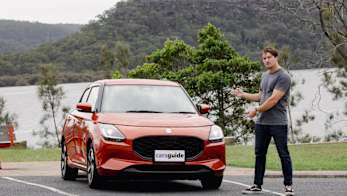Chinese newcomer Chery has admitted it has work to do fine-tuning its advanced driver assistance systems (ADAS) for the Australian market.
Despite the Chery Tiggo 4 Pro scoring a five-star ANCAP safety rating, CarsGuide’s real-world experience with the car found its lane keeping assistance system poorly calibrated for Australian conditions.
Peter Matkin, Chery’s Director of Engineering for International Programs, was recently in Australia for the launch of Chery’s more premium brand, Jaecoo and its new model the J7. It demonstrated dramatically different ADAS behaviour, including much better lane keeping assistance.
However, Matkin indicated that it’s not as simple as taking the software tuning from the Jaecoo model and applying it to the Chery vehicles, as they have different hardware.
“We've got different suppliers, and from an engineering perspective it’s a little bit frustrating sometimes when you get different suppliers, then you've got different levels of capability,” Matkin said.
He then seemingly admitted that the brand may have rushed some of its vehicles to international markets without ensuring they met local standards, saying: “I don't say we're perfect because we're not, we've still got a lot of work to do to get into different markets and the advantage we had is we’re quite quick.
"But when we started with all of the ADAS work, we were effectively just meeting legislation. We told the suppliers, this is the legal requirement, we need to meet this. So from a supplier perspective, he doesn't care whether the car bounces between the lanes. He doesn't care. When I drive the car, I say, ‘this is shit, we're not selling this.’ So, you know, we now give a lot more targets now, to the supplier.”
The notion that carmakers are adding active safety features to meet safety legislators, such as Australia’s ANCAP, which do not currently assess the real-world application of these systems is not a revelation to those within the industry, but to hear it from a high-level engineering director raises some serious questions surrounding the effectiveness of modern ADAS systems across multiple brands, not just Chery.
But Matkin was clear that Chery is not just looking to ‘tick the boxes’ and is determined to ensure its ADAS technology is class-leading in the future. To that end the company has partnered with Germany’s Aachen University, which specialises in engineering and technology, to set much stricter targets for its suppliers. He indicated the improved system in the Jaecoo J7 is a sign this initiative is already working.

“So we put a whole program with them and with another engineering service provider to develop a whole bunch of targets for us. And we've cascading that to all the suppliers and that's why the system is better and it will just get better and better all the time,” he said.
Chery Australia Spokesperson, Tim Kreiger, made it clear that Chery is determined to improve its ADAS technology, despite already having the five-star ANCAP rating, with a team of engineers embedded with the local operation, starting with the Jaecoo J7.

“I think in this car the work that has been done locally has been extensive. Hours and hours of testing. We've got in our office at the moment, I reckon there's about 20 engineers from China, who are sitting there doing local validation on future products.”
Additionally, ANCAP has acknowledged that it will conduct real-world testing of ADAS-type systems from 2026 in partnership with Euro NCAP.








.jpg)
.jpg)


.jpg)












.jpg)


